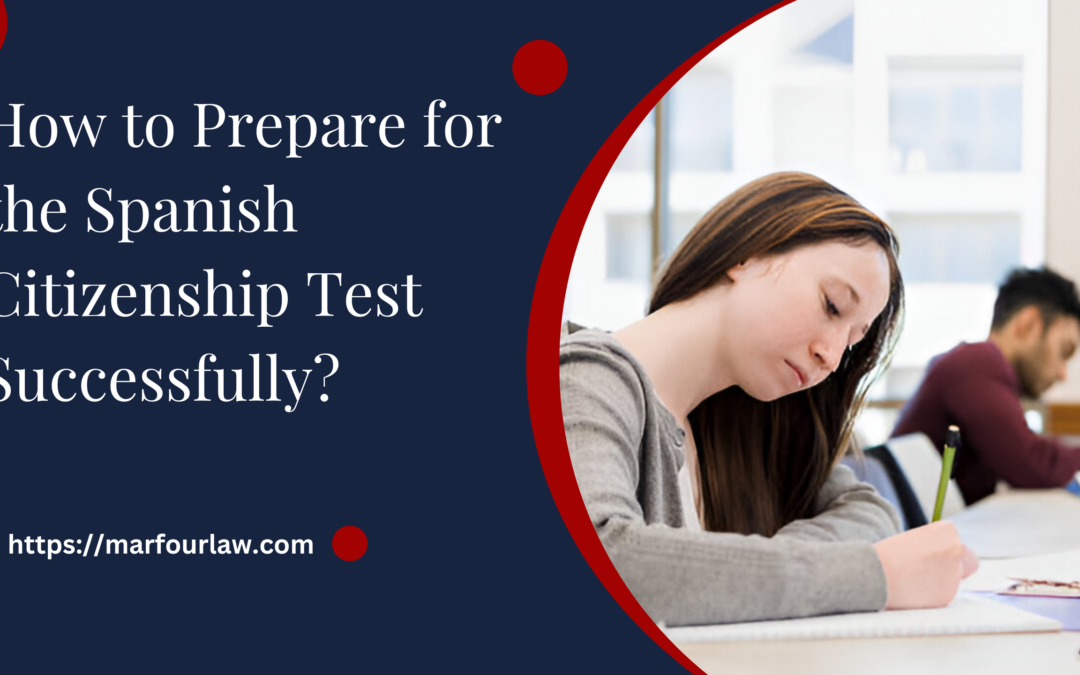If you’re thinking about obtaining Spanish citizenship, one of the key steps is passing the Spanish Citizenship Test residents must take. This test is designed to ensure that applicants understand the culture, history, and legal systems of Spain. Whether you’re coming from Canada, the United States, or any other country, navigating the path to citizenship can feel complex. In this guide, we’ll break down the process and give you everything you need to know about the Spanish nationality test, also referred to as the CCSE exam. We’ll even touch on how the US citizenship exam in Spanish compares. Ready to find out more?
What Is the Spanish Citizenship Test?
The Spanish citizenship test, officially known as the “Examen de Nacionalidad,” is a key requirement for foreigners seeking to become citizens of Spain. This exam evaluates applicants on their knowledge of Spanish culture, history, and the legal rights and responsibilities of Spanish citizens. Understanding what this test entails can help you prepare effectively and increase your chances of success.
Structure of the Test
The test consists of two main components: a written examination and an oral interview. The written part includes questions related to Spanish history, geography, culture, and the political system. You’ll be asked about significant historical events, famous Spanish figures, and the country’s geographic features. The oral interview typically involves discussing your answers from the written test and may also include questions about your personal background and reasons for applying for citizenship.
Number of Questions
Applicants must answer a set number of questions correctly to pass. The typical format includes 25 multiple-choice questions, and you need to get at least 15 correct to pass. It’s crucial to study the materials provided by the Spanish government and to practice answering sample questions to familiarize yourself with the test format.
Study Materials
To prepare for the exam, the Spanish government offers a variety of study materials, including guides and sample questions. Additionally, many language schools and online resources provide courses specifically designed to help applicants study for the citizenship test. These resources cover everything from historical facts to current events, ensuring you have a well-rounded understanding of Spain.
Cultural Understanding
Beyond just rote memorization of facts, the test also emphasizes the importance of cultural understanding. Applicants are encouraged to learn about Spanish customs, traditions, and values. This cultural knowledge not only helps you pass the test but also enriches your experience as a future citizen, helping you integrate more smoothly into Spanish society.
Importance of the Test
Passing the Spanish citizenship test is a critical step in the naturalization process. It demonstrates your commitment to becoming a part of Spanish society and your willingness to engage with the culture and history of the country. Successfully completing the test can also make you feel more connected to Spain, giving you a deeper appreciation of its heritage and values.
What Does the Spanish Nationality Test Cover?
The Spanish Nationality Test, known as the Examen de Nacionalidad, is a crucial step for individuals seeking to obtain Spanish citizenship. This exam evaluates your understanding of Spain’s culture, history, and the responsibilities of being a citizen. At Marfour International Law Firm, we understand that preparation is key to success in this process. Let’s break down what the test covers so you can approach it with confidence.

Structure of the Test
The test is structured into two main components: a written exam and an oral interview. Each part plays a vital role in assessing your knowledge and readiness to become a citizen.
Written Exam
The written portion consists of 25 multiple-choice questions. You must answer a minimum of 15 questions correctly to pass. The topics covered in this section include:
- Spanish History: This part includes significant historical events, important figures, and milestones in Spain’s development. You should be familiar with topics such as the Spanish Civil War, the Franco dictatorship, and key figures like Christopher Columbus and Miguel de Cervantes.
- Spanish Geography: Understanding Spain’s geographical features is essential. Questions may cover major cities, autonomous communities, rivers, and mountain ranges. Be sure to know the locations of key landmarks and regions within Spain.
- Political System: You will need to understand the structure of the Spanish government, including the roles of the King, the Parliament, and the Judiciary. Familiarize yourself with Spain’s constitution and the rights and duties of its citizens.
- Culture and Traditions: Spanish culture is rich and diverse. Expect questions about traditional festivals, music, art, and literature. Knowing about significant cultural contributions and local customs can enhance your answers.
Oral Interview
The oral portion of the test typically follows the written exam and is designed to assess your ability to communicate effectively. During the interview, you will discuss your answers from the written test and may be asked additional questions about:
- Your personal background and motivations for applying for citizenship.
- Your understanding of Spanish culture and values.
- How you plan to integrate into Spanish society.
This interview is an excellent opportunity to showcase your language skills and your commitment to becoming part of the Spanish community.
Study Materials
Preparing for the test is essential for success. The Spanish government provides various resources, including study guides and sample questions. Additionally, many language schools and online platforms offer courses focused on the nationality test. Utilizing these materials will help you become familiar with the test format and the types of questions you may encounter.
Importance of Cultural Knowledge
Cultural knowledge is a significant aspect of the nationality test. Beyond simply memorizing facts, understanding Spain’s customs and values will enrich your experience as a future citizen. Engaging with the culture not only helps you pass the test but also fosters a deeper connection to the country you wish to call home.
The Spanish Nationality Test covers essential aspects of Spain’s history, geography, political system, and culture. By understanding the structure of the test and the topics involved, you can prepare effectively and increase your chances of success. At Marfour International Law Firm, we are here to guide you through the citizenship process, providing the support and resources you need to achieve your goal of becoming a Spanish citizen. Remember, preparation is key, and with the right approach, you can confidently face the test and embrace your new identity in Spain.
How to Prepare for the Spanish Citizenship Test?
Preparing for the Spanish Citizenship Test, or Examen de Nacionalidad, is an important step in your journey to becoming a Spanish citizen. At Marfour International Law Firm, we know that understanding what to expect can make a significant difference in your preparation. Let’s explore effective strategies to help you get ready for this essential exam.

Utilize Official Study Materials
The Spanish government provides official study materials to help you prepare for the test. These include guides, sample questions, and resources on Spanish culture and history. Make sure to review these materials thoroughly as they will provide you with the most relevant information for the test.
Additional Resources
In addition to official materials, consider using supplementary resources such as:
- Online Courses: Many platforms offer courses specifically designed to help you prepare for the citizenship test.
- Flashcards: Create or use pre-made flashcards to help memorize important facts about Spanish history and geography.
- Practice Tests: Take advantage of practice tests available online to familiarize yourself with the question format and timing.
Create a Study Plan
Developing a study plan can help you stay organized and focused during your preparation. Consider the following steps:
- Set Goals: Define what you want to achieve each week. This could include completing specific chapters of study materials or taking practice quizzes.
- Schedule Study Time: Set aside regular study sessions in your calendar. Consistency is key to retention.
- Break It Down: Instead of trying to learn everything at once, break the material down into manageable sections. Focus on one topic at a time.
Engage with Spanish Culture
Immersing yourself in Spanish culture can significantly enhance your understanding and appreciation of the country. Here are some ways to do this:
- Watch Spanish Movies and TV Shows: This can improve your language skills and expose you to cultural references.
- Listen to Spanish Music and Podcasts: Engaging with audio content can enhance your listening comprehension.
- Read Spanish Literature or News Articles: This will improve your reading skills and provide insights into current events and cultural themes.
Practice Speaking Spanish
Since the oral interview assesses your ability to communicate in Spanish, it’s crucial to practice speaking. Consider the following:
- Language Exchange: Find a language partner or join a conversation group to practice speaking Spanish regularly.
- Mock Interviews: Conduct practice interviews with a friend or family member. This will help you feel more confident in your responses during the actual interview.
Stay Informed About Current Events
The citizenship test may include questions about recent events and current affairs in Spain. Keeping up with the news will not only help you prepare but also demonstrate your interest in being an informed citizen.
How the CCSE Test Fits into the Overall Naturalization Process?
Thinking about becoming a Spanish citizen? If so, you’ll need to familiarize yourself with the CCSE test. This test, short for “Conocimientos Constitucionales y Socioculturales de España,” assesses your knowledge of Spanish culture, society, and constitutional principles. But how does this test fit into the broader naturalization process? Let’s explore that together.
Importance of the CCSE Test
First off, the CCSE test is a crucial milestone in your journey toward Spanish citizenship. It’s not just a formality; it serves as proof that you have a solid understanding of the country you want to call home. Think of it like studying for a driving test. You wouldn’t want to hit the road without knowing the rules, right? Passing the CCSE test demonstrates your commitment to integrating into Spanish society.
Eligibility for the Test
Before you can take the CCSE test, you must meet specific eligibility requirements. Typically, you’ll need to have legal residency in Spain for a certain period, usually ten years, or two years if you’re from a Latin American country. Plus, you’ll need to be at least 18 years old. This step is essential because it ensures that only serious applicants get to the testing phase.
Preparation for the CCSE Test
Getting ready for the CCSE test might feel overwhelming at first, but there are plenty of resources available. You can find study guides, practice tests, and even courses designed to help you prepare. It’s like getting ready for a big exam in school; you’ll want to put in the effort to succeed. Engaging with Spanish culture, history, and society can also make this process easier and more enjoyable.
Taking the CCSE Test
Once you feel ready, you can register for the CCSE test. The test consists of 25 questions, covering various topics about Spain, including its history, geography, and political system. You need to score at least 15 correct answers to pass. This part of the process is like a rite of passage; passing it shows that you’re equipped with the knowledge necessary to contribute positively to Spanish society.
CCSE Test in the Naturalization Timeline
So, where does the CCSE test fit into the overall naturalization process? After you pass the test, you can move forward with your citizenship application. This usually involves submitting your application to the Civil Registry along with your test results and other required documents. It’s a significant step, marking your commitment to becoming a full-fledged member of Spanish society.
Waiting for a Decision
After submitting your application, it’s a waiting game. The processing time can vary, but it typically takes several months to a year. During this period, you might feel anxious, but remember that you’ve already completed one of the most critical steps by passing the CCSE test.
In short, the CCSE test is a vital component of the naturalization process in Spain. It’s not just a hurdle to jump over; it’s an opportunity to learn and immerse yourself in Spanish culture. By passing this test, you’re proving your dedication to becoming a responsible citizen. If you have questions about the naturalization process or need assistance with your application, don’t hesitate to reach out to Marfour International Law Firm. We’re here to support you on your journey to Spanish citizenship!
Common Mistakes to Avoid When Taking the Spanish Citizenship Test
Taking the Spanish citizenship test can feel like a big step in your journey to becoming a Spanish citizen. With the pressure of wanting to pass, it’s easy to make a few common mistakes. But don’t worry! Knowing what to watch out for can help you stay on track. Let’s dive into some common pitfalls and how to steer clear of them.

Skipping the Preparation
One of the biggest mistakes you can make is thinking you don’t need to prepare for the test. Sure, you might know a lot about Spain, but the CCSE test covers specific topics that you may not be familiar with. It’s like trying to bake a cake without checking the recipe. Take the time to study using official materials, practice tests, and study guides. This preparation is key to feeling confident on test day.
Not Understanding the Test Format
Another common error is not fully grasping the test format. The CCSE test consists of 25 multiple-choice questions, and you need at least 15 correct answers to pass. If you don’t know how the questions are structured or the types of topics covered, you might be caught off guard. Familiarize yourself with the format to feel more at ease when it’s time to take the test. Think of it like getting to know a new game before playing—you’ll perform better if you know the rules!
Overlooking the Time Limit
Time management is crucial during the test. Some candidates may get so caught up in answering questions that they forget about the clock. The CCSE test usually has a specific time limit, so practice answering questions within that timeframe. You wouldn’t want to run out of time and leave questions unanswered. It’s a bit like pacing yourself during a long run; you want to ensure you have enough energy to finish strong!
Ignoring Cultural Context
The test not only covers Spanish history and geography but also cultural aspects. Some candidates make the mistake of focusing solely on facts without considering the broader cultural context. Understanding how historical events shaped modern Spain can help you answer questions more accurately. It’s like reading a book—you’ll grasp the story better if you understand the characters and their backgrounds.
Not Practicing Enough
Practice makes perfect, right? Yet, some people underestimate the power of doing practice questions. You might feel confident about your knowledge, but practicing can reveal gaps in your understanding. Make use of sample questions and past tests to simulate the test experience. This way, you’ll feel more comfortable and familiar with the material. Think of it as rehearsing for a play; the more you practice, the better you’ll perform!
Forgetting to Review the Official Resources
Many candidates overlook the importance of using official resources from the Spanish government. These materials are designed specifically to help you prepare for the test, so don’t miss out! Relying solely on third-party resources can leave you misinformed or lacking crucial details. Check the official website for the latest study guides, videos, and practice exams.
Stressing Out on Test Day
Finally, try not to let anxiety get the best of you on test day. It’s normal to feel nervous, but stressing out can cloud your judgment. Arrive early to the test center, take deep breaths, and remind yourself of all the hard work you put into preparing. Treat it like any other important appointment; you’ve got this!
Avoiding these common mistakes can significantly improve your chances of passing the Spanish citizenship test. Prepare thoroughly, understand the test format, manage your time wisely, and don’t forget to stay calm on the big day. If you have any questions about the citizenship process or need assistance, Marfour International Law Firm is here to help. We’ll support you every step of the way to make your journey to Spanish citizenship as smooth as possible!
FAQs
How hard is the Spanish nationality test?
The CCSE isn’t extremely difficult, but it requires adequate preparation. Studying the key topics and practicing beforehand will help ensure you pass the exam.
Is the US citizenship exam available in Spanish?
Yes, but only for specific applicants who meet certain age and residency criteria.
What is the passing score for the CCSE?
You need to answer 15 out of 25 questions correctly to pass.
Can I retake the CCSE if I fail?
Yes, you can retake the test if you fail, and your exam fee usually covers two attempts.
Do I need to know Spanish to take the test?
Yes, the test is conducted in Spanish, so you’ll need at least a basic understanding of the language.
Conclusion
Taking the citizenship test Spanish is an important step towards becoming a Spanish citizen. By studying the right materials, practicing ahead of time, and understanding the test format, you can pass the CCSE with confidence. From there, the journey to citizenship continues, but passing the test is a crucial milestone on your path to becoming a full-fledged member of Spanish society.

